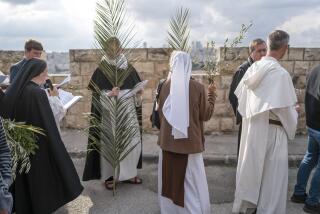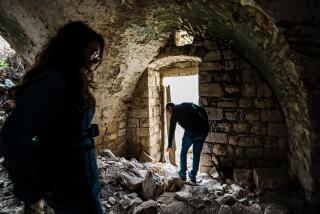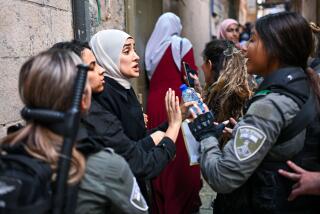Fighting Has Iraq’s Thoughts Elsewhere
- Share via
BAGHDAD — In the mosques and streets of Iraq, all the talk Friday was of war, but for a change it was someone else’s.
In a country that days ago seemed to be heading toward civil war, where whole neighborhoods were engulfed in sectarian battles, the fighting between Israel and the Shiite Muslim militant group Hezbollah dominated talk at Friday prayers, on the streets and in newscasts.
“Dozens of innocent men, women and children are being killed for a couple of military men, while they can be freed through negotiations,” Sheik Abdul Mehdi Karbalai told worshipers in the Shiite city of Karbala, condemning the “destruction, killing and horror” by the “Zionist war machine.”
Certainly the violence and chaos here hasn’t stopped, despite a Friday daytime vehicle ban and 58,000 security forces deployed in the capital. On Friday, 11 Iraqi soldiers were killed at a checkpoint, two mosques were bombed and at least three people were beheaded.
Yet Friday sermons -- many by clerics allied with the U.S.-backed government -- were not aimed at rival sects, lawless militiamen, ineffective politicians or even U.S. forces.
They were aimed almost exclusively at Israel, which has sealed off Beirut by bombing the airport and the road to Damascus, Syria, as well as blockading the Lebanese coast.
Other Muslim countries also harshly criticized the Israelis, but none did so amid the kind of chaos and violence that engulfs Iraq. It was as if Iraq’s religious leaders used the Lebanese crisis to divert attention from the country’s own internal problems.
Nowhere was it more obvious than with radical Shiite cleric Muqtada Sadr, who has been under fire in recent days because of his Al Mahdi army, a militia accused of the execution-style slayings Sunday of three dozen Sunni Muslims.
Sadr set the tone for Friday prayer services nationally in a morning statement condemning Israel and the United States.
“The eyes shed tears and the hearts ache as we see our dear people in Lebanon suffer from what the Zionist terrorist does with the aid from America, the enemy of the people,” he said. “Let everyone know that we in Iraq are not going to remain with our hands folded against this Zionist march.”
In Sadr City, a poor Shiite neighborhood of Baghdad, a cleric read Sadr’s statement at prayers and likened the U.S. invasion of Iraq to the Israeli attack in Lebanon. Afterward, demonstrators passed out leaflets in support of Lebanon, shouting, “Down with Israel, down with America!”
In the city of Najaf, Sadruddin Qubanchi, an influential Shiite cleric loyal to Grand Ayatollah Ali Sistani, the highest-ranking Shiite cleric in Iraq, declared Israel’s actions unacceptable and unjustified.
“Israel is conducting an armed invasion of Lebanon in every sense of the word,” Qubanchi told worshipers. “This cannot be ignored by the international community.”
At a demonstration in the northern city of Kirkuk, resident Qasim Jaafer complained, “If one of the Arab countries has done what Israel is doing, then world war will break out.”
Meanwhile, the violence in Iraq went on. Gunmen killed 11 soldiers at an Iraqi army checkpoint on the dangerous Kirkuk-Tikrit highway.
Seven people were killed when a roadside bomb exploded near a Sunni mosque in northern Baghdad as worshipers were leaving Friday prayers. Most of those killed were from the same neighborhood, because a curfew prevents many people from attending prayers far from their homes.
In Baqubah, northeast of Baghdad, two people were killed and four injured when six mortar shells fell in the yard of a Shiite mosque.
A Shiite man was beheaded in Baghdad’s religiously mixed Jihad neighborhood, the site of sectarian violence where dozens died Sunday. Two others were killed at a makeshift checkpoint in the neighborhood.
And Kirkuk police said they found the headless bodies of two Iraqi army soldiers. A police source also said armed men kidnapped two street cleaners working in downtown Kirkuk.
More to Read
Sign up for Essential California
The most important California stories and recommendations in your inbox every morning.
You may occasionally receive promotional content from the Los Angeles Times.













